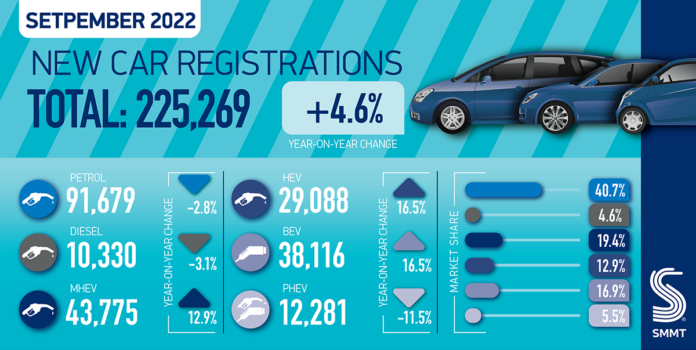The UK new car market recorded its second successive month of growth in September, with registrations rising 4.6%, according to the latest figures released today by the Society of Motor Manufacturers and Traders (SMMT).
During what is typically the second biggest month of the year for the sector, 225,269 cars joined Britain’s roads. While this was a 9,957 unit increase on last year, when the industry recorded its weakest September since 1998, overall registrations for the month are still some 34 per cent below pre-pandemic levels as the industry continues to battle issues constraining supply to fulfil a backlog of orders.
Bucking recent trends, registrations by large fleets grew by 12.5% or 11,315 units, although this still represents a significant decline on pre-pandemic volumes. Registrations to private buyers, meanwhile, fell by -3.6%.
Electric vehicle uptake continued to rise, albeit at a slower rate of growth than seen earlier in the year, with the second highest monthly volume of battery electric vehicle (BEV) registrations in history, up 16.5% to 38,116 units.
Although registrations of plug-in hybrid vehicles (PHEVs) declined by -11.5% to 12,281 units, overall plug-in vehicles accounted for more than one in five new cars joining UK roads in the month. As a result, almost quarter of a million have now been registered in 2022 – meaning that UK drivers and fleets have now registered more than one million plug-in EVs, a quarter of which in this year alone.
Mike Hawes, SMMT Chief Executive, said,
September has seen Britain’s millionth electric car reach the road – an important milestone in the shift to zero emission mobility. Battery electric vehicles make up but a small fraction of cars on the road, so we need to ensure every lever is pulled to encourage motorists to make the shift if our green goals are to be met.
The overall market remains weak, however, as supply chain issues continue to constrain model availability. Whilst the industry is working hard to address these issues, the long-term recovery of the market also depends on robust consumer confidence and economic stability.







